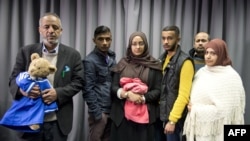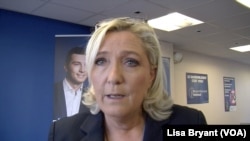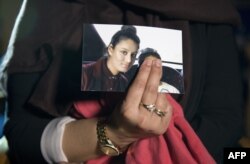In northern France, Lydie and Patrice Maninchedda have been waging an uphill battle, sustained by local media, to repatriate their three grandchildren from Syria. They have never met the children, ranging from one to five years. Nor has the couple seen their daughter, Julie, since she left with her then-husband to join the Islamic State group in 2014.
Then came an anonymous message last month that Julie was dead — and the grandchildren, now orphans, were detained in a Kurdish camp for internally displaced people.
“It is overwhelming to find them,” Patrice Maninchedda told France Bleu radio, of the three, who are considered by law to be French nationals. “Like all grandparents, we want to see our grandchildren. They need to be reintegrated into a normal life and family.”
The Maninchedda's hopes may be realized sooner rather than later. The planned U.S. troop withdrawal from Syria prompted the French government to announce it was considering repatriating dozens of citizens now detained by the Kurdish-led Syrian Democratic Forces in the northeastern part of the country.
While some are hardened jihadists or their wives, roughly three-quarters are children under the age of seven, according to French Justice Minister Nicole Belloubet.
With the Islamic State group all but territorially vanquished in Syria, U.S. President Donald Trump urged European nations to repatriate captured fighters and put them on trial at home — a demand rejected for now by the French government, while Germany said doing so would be difficult.
“At this stage France is not responding to the demands” of Trump, Belloubet told France 2 television, saying Paris would consider repatriating French IS fighters on a case-by-case basis. But reports suggest French officials have agreed to repatriate French orphans now in Syria, although those children who are still with their parents are more problematic, and would need parental consent to be separated.
Similar dilemmas are faced elsewhere in Western Europe, from which nearly 6,000 nationals left to join IS ranks, according to the International Centre for the Study of Radicalization, at King's College London. Many died in battle, and more than 1,700 have returned, it estimates.
Repatriating both the fighters and their children is politically explosive. Critics worry it will be difficult to prove in court crimes committed on the battlefields of Iraq and Syria, and that the children raised under Islamic State occupation could grow into dangerous adults.
Shaping public opinion too are the 2015 Paris attacks, which involved some returnee fighters.
“The question is whether to repatriate jihadists who left France, burned their French passports, and headed off to associate with Islamist fundamentalists, to become barbarians and strike our country,” said far-right leader Marine Le Pen in an interview.
“And the answer is no,” she added of the adults. “They should be judged in the places where they committed the atrocities. It’s the very least one can do, out of respect for the victims.”
Le Pen did not offer an opinion on the fate of the minors, describing them simply as “instrumentalized.”
Yet by not taking action, others argue, France risks having jihadis and their families disappear into a turmoil-torn region, posing a potentially serious security threat later on.
Even for children, the challenges of repatriation are massive, experts say. While some may have been sheltered from the fighting, many others are likely brainwashed by jihadi ideology. Still others may have witnessed or participated in horrific acts. Their background may come to haunt them — and France — later on.
“They are children, they aren’t guilty of crimes committed by their parents. And from a humanitarian point of view we must welcome and take care of them,” said sociologist Gerald Brunner, of the Jean Jaures Foundation — even as he warned that dealing with the returnees would be “difficult.”
‘We’d be right to imagine the worst, that they could commit a terrorist act on our territory,” Brunner said, adding, “authorities cannot avoid posing this question.”
Until recently, the preferred option was to do very little for the minors — unless their families pressed French authorities for action, said Farhad Khosrokhavar, a sociologist and expert on radical Islam.
“The French government—and one can generalize this to most of the Europeans—they don’t want them back,” Khosrokhavar said, in an interview last year. “Because they are afraid of them, and they know there will be problems.”
Today, repatriation claims involving children are growing, adding to the pressure. In Britain, 19-year-old Shamima Begum is asking to return home with her newborn, four years after joining Islamic State in Syria as a schoolgirl.
In neighboring Belgium, a court ordered the government in December to repatriate half-a-dozen children and their mothers detained by Kurdish fighters in northern Syria.
In France, fewer than 70 children had returned as of a year ago out of up to 700 in Iraq and Syria, according to different estimates. Most are under the responsibility of a court outside Paris. Some are placed in foster care; others taken in by their families. Those over 13 who participated in fighting can be detained, according to media reports.
Now, as France is pressed to bring back the rest, experts say there is no easy answer or blueprint to deal with them.
“The ideal would be to give them the opportunity to live with their mother and of course follow them psychologically and institutionally in order to deradicalize the mother,” said Khosrokhavar, the Islamist expert. But so far, there seems little appetite for repatriating parents en masse.
Sociologist Brunner suggests applying other examples of indoctrination — including children brainwashed by religious cults — in dealing with the IS minors.
“Nobody is ready for this kind of situation,” he said. “Nobody knows exactly what to do. The only we know is we can’t do nothing.”









